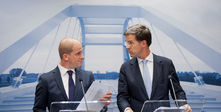 Political leaders presenting plans Proudly the new government presented their plans earlier this autumn. Tomorrow the plans for foreign aid will be subject of discussions in parliament. I wonder how many holes are left in the bridge. The picture of the unfinished bridge that decorated the wall during the presentation of the coalition government agreement resembles to some extend the unfinished character of the agreement itself. It's content caused quite some grumbling at the side of the liberals as it contained measures aiming at re-distribution of benefits from the richer to the poorer segments in society. It definately had sleepers, but possibly also 'sleepers' constructing it. It took the politicians that drafted the plan a couple of days to realize that they went a bridge too far. Market Garden That reminds us of the battle of Market Garden, where many allied forces lost their lives fighting for a bridge near Arnhem in Second World-War. A battle that was lost causing the freeing of the rest Netherlands to delay for one horrible winter, where many perished including my own grandfather who was deported to Germany. How many lives would have been saved and how different the Netherlands would have looked like today if that one battle had been won. Likewise I sense there are a couple of fierce battles ahead that will substantially alter governance in the 21st century, no matter the result. Question is: Is there anything to gain in battling? Or will this battle only know losers? Governance in crisis It is clear that governance is in crisis. At the same time at many places open data is embraced as the new solution that in the end will empower all individuals to take their own decisions, not needing anything or anyone else to exercise power over others. Though this may sound appealing, the result will be complete anarchy and the survival of the fittest. In the end new power structures will re-emerge. Suddenly we may find those in control of data being in control of the world. Data is the next raw material that people will do their 'gold rush' for. Is open data the next leap forward? Or is it the next level of inequality where many find themselves left behind? I think we should be careful with applauding open data initiatives like the one in Kenya recently soon to be followed by many others following the rolling out of the IATI standard. Open data and cyber warfare In situations where open data serves to undo inequality and cut through unhealthy power dynamics it has my whole-hearted support. At the same time the impact of the weapon of open data may not be underestimated. Just google on 'cyber warfare' and get a healthy perspective on what value data has. Open data may very well prepare the battlefield for a final and decisive attack on civil society, that to some extend still serves as counterveiling power for the betterment of governance. Innovative governance and data sovereignty As many political parties rethink their strategies how to engage civilians in governance issues, they will feel an urge to prioritise commnity self-governance, certainly in the absence of capital. For that open data may serve a purpose. However, in such cases data formats should not be imposed by outsiders rendering the community vulnerable to abuse. Data sovereignty should be developed along with open data in order to protect its integrity and authenticity. I just want to remind ourselves of the battle of Market Garden. There was no way to avoid a clash. Not winning the battle also had severe consequences. Finally it was no battle between bataljons, or nations but a battle between ideologies. One ideology that envisioned a superb human race much smarter then the rest of the world, and the other one an ideology of freedom of choice and peaceful co-existence. Bridges In war times sometimes bridges need to be build; Sometimes they need to be destroyed, depending on who is using them for what purpose. Sometimes tough battles are needed to bring lasting peace. I just hope we will find ourselves on the right side of history and do not succumb into a meaningless anonymity of open data where a project only gets relevance in the integrated whole and has no longer a direct meaning for people it is aiming to serve. (also see my blog at ¥OURWORLD regarding the white paper on open data in the UK) 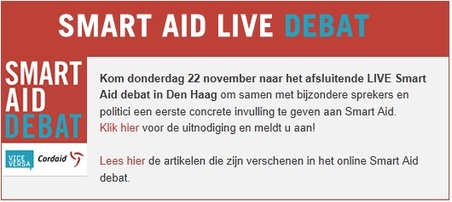 the advertisement for yesterday's debate at Vice Versa's website (www.viceversaonline.nl) Vice Versa organized an event to wrap-up a series of online debates trying to replicate what Frans Bieckman did some time ago before the Broker finally broke down: Once again reviving the debate about what development policy should be all about. With the exception of the contribution of 'old-timer' Jack van Ham and a few people from the audience it was a display of a sector in disguise, assuming Vice Versa succeeded to gather together the sharp minds of the development community. No dissent The involvement of two coalition parties in the debate and the absence of opposition parties did not help the debate either. No discussion was allowed about funding, as if finance is not a means to an end. Only van Ham showed his anger with the unprecedented reductions in ODA. As he remained the only one grumbling the IOB director Ruerd Ruben, who sat next to me, concluded that the sector indeed still was over-funded. Except for Cordaid (who co-organized) none of the bigger NGOs sent their director to participate in the debate. And even René Grotenhuis apparently had nothing to add except for stating that the world is changing and therefore NGOs should reinvent themselves. It really felt that many staff members of NGOs present had no energy left to express their discontent with the current policy flow that values self-interest above sacrifice for the common good. Crossroads or shrinking space Academicians had clearly nothing to gain from this sesion. Despite the large number of knowledge institutions on international development reiterated by Ingrid de Caluwé, none of them made their voice heard or even were present. However, that may be credited to them as they may have opted for listening to global voices at the PSO civil society at crossroads debate at ISS that was organized the same afternoon. A compelling similarity between shrinking civil society space in Ireland and Zimbabwe reminded me of the dynamics in the Netherlands. The Vice Versa meeting only confirmed this. Voices from outside Tabitha Gerrets of Aqua for All made a sensible remark reminding the audience to differentiate between the different instruments that the Dutch development aid is using. What aid are we actually talking about? As one of the few participants she knew her numbers and urged the speakers and the audience to look at each of the channels of aid separately and identify what works and what does not and then make decisions on budget cuts or increments. Neither VVD nor PvdA had the guts to face up to this challenge, showing the shallowness of their involvement in the sector. SMART aid It was striking that the most innovative idea came from outside the ‘sector’ from Frank van Berkum, a project manager of Oranjewoud, a consulting firm in infrastructure development and landuse. He had written a nice suggestion that time may soon come that we may need some aid ourselves in how to deal with some of our development challenges (for instance our rising health expenditures). During the break it turned out that his formal employment is not the only way in which he contributes to small changes in the world. In the end we may conclude that Dambisa Moyo was right. Official development AID is DEAD. Will we see the revival of voluntarism as a way to 'deconstruct' professionalism? 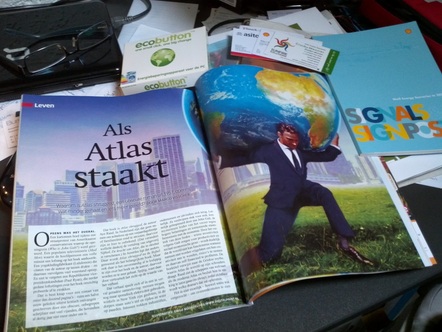 The proceeds of a day at the National Sustainabiy Conference Yesterday I attended the 13th National Sustainabiliby Conference in the Netherlands. Key-note address was given by sustainability guru John Elkington. This time I could not escape comparing two Johns. Zeronauts This spring John Elkington already introduced his book zeronauts at a Deloitte meeting in Rotterdam as well as at the Global Compact meeting in Arnhem. He is spreading his zero gospel around the globe, with zero-emission as an attractive concept. As I had attended one of his speeches at earlier occasions I was not surprised by the shock doctrine he presented combining realism with optimism in a way that sounds very appealing. Ode magazine for intelligent optimists This optimism is also shared by a group of other young minds that had a display at the conference, presenting their 'Ode' magazine for intellligent optimists. And actually it should not have come as a surprise to me to find an article in their latest issue reviewing the novel "Atlas Shrugged" by Ayn Rand, published back in 1957, which I read some time ago when I dug it out of a second-hand shelf in a book store. In Europe this novel has remained largely unknown while in the United States it has been a bestseller after the Bible. Objectivism In this novel another John stands out as a welfare prophet, professing his faith in individual capacity and displaying his hatred for state-ism and related social protection mechanisms, discouraging individual entrepreneurship and in his view tearing the world apart. The book describes a period of economic decline, accelerated by a strike of the big industrial powers that were 'carrying the world' before, hence the title "Atlas Shrugged". During this period of decline only his name appears in conversations that end with the intriguing question: "Who is John Galt". When the world has almost entirely fallen apart John finally introduces himself through radio like this: "You are listening to John Galt. I am the men who loves his life. Who does not sacrifice his values. Who has released you from your victims hence destroyed your world (...). You have sacrificed righteousness to grace, independence to unity, reason to trust, richness to needs, self respect to self denial, happyness to duty. You destroyed everything you considered evil. (...) The world around you is not the product of your sins. It is the product of your image of your morale." The underlying philosophy called 'objectivism' carries an absence of moral behaviour and follows a path of pure self-interest. Ayn Rand had many followers like Alan Greenspan (heading the Federal Reserve in the US prior to the financial crisis). Worth reading in this context is the criticism formulated by our own Hans Achterhuis, De Utopie van de Vrije Markt (en: The Utopia of the Free Market) discussing Rand's philosophy and showing its utopian characteristics. What kind of John is John Elkington I could not avoid making a comparison between John Galt and John Elkington while receiving his message with respect for his rhetoric skills. Future will show how many of our industrialists will buy into a message of creative self-destruction under the flag of sustainability. It is obvious that a number of unhealthy market mechanisms currently dictate the political leadership where to go next and a change in the system is required, which may be different from system change though. I just wonder whether industrialists engaged in corporate social responsibility embrace the same phylosophy as Ayn Rand and seek to extinguish the morale of sacrificial love and self-sacrifice-for-the-common-good. Personally I would prefer the latter to become a driver for corporate social responsibility rather than embracing the self-edifying philosophy of Rand. At least it did not bring her much satisfaction if we have to belief her biographers. Once in a while one realizes how much change has been witnessed in only two decades. However some things never change. I came accross a nice illustration when reviewing the proceedings of the second session of the Global Conference on Agricultural Research for Development 2012 in Urugay under the ambitious title: "Delivering the change together". I was struck by the fact that many familiar faces appeared in the programme, finding much of the network that I had met while working for APAARI some twelve years ago still up and running. Dr. Paroda, a seasoned government bureaucrat and esteemed scientist and co-founder of the green revolution, was heading the network at the time I was asked to support him in the drafting of a vision 2025. He still is. We are halfway 2025 now since the vision was drafted. And I have to say, I have not come across more perseverance in pursuing the same goals for so many years, as with Dr. Paroda. One thing has changed though. The title of his talk is only aiming at 2014 this time. We no longer have the luxury of looking 25 years ahead I presume as the world is changing at a rapid speed. However, people stay the same, and most of us do not experience massive changes in our character, ambitions and personal goals. This realization may help in dealing with some of the changes around us. Staying faithful to ourselves will help to pursue the same goals, though mechanisms to achieve them may change.
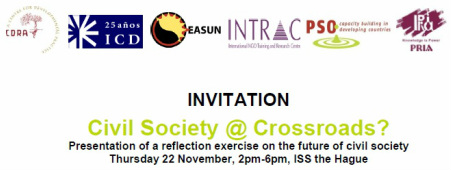 click image to download invitation Next week an interesting group of people will meet at ISS to exchange views on the prospects of civil society. It coincides with a number of gatherings that are typical for this time and age. I think about the UN focussed Post-2015 discussion in London that recently ended. A post-2015 agenda was drafted, providing some directions highly needed at cross-roads: 1) adopt a human rights‐based approach; 2) address growing inequality and mainstream equity; 3) promote social protection; 4) involve and lead to participatory processes and decision making; 5) prioritize capacity building and local management of development; 6) protect Earth’ ecosystems and equitable access to resources; 7) enable job creation and investment in the poor and marginalized. Nice governmental language hard to put in practice. I also think about the 13th National Sustainability Congress in the Netherlands, where a.o. people are pursuing the Earth Charter amidst heavy presence of the private sector. Very good practices will be presented but requiring political will to set the standards. What can civil society do to bring these global and national, but also public and private sector perspectives together without being trapped into a bureaucratic process, maximising the dynamics present within civil society space. How can citizens get on board of these processes that seem to have a dynamic of their own. The workshop that forms part of PSO's wrap-up conference offers what could be the last opportunity to come together government funded, as the government is running out of resources. The latter may provide a unique opportunity to reposition civil society firmly in between government, citizens and companies, ensuring a fair and equitable world economy protecting the world ecosystem from internal hazardous powers and preserving it for generations to come. More information on the PSO closing conference.. |
About meMy name is Reinier van Hoffen. U®Reading
Click here for a summary.
Also find the text of a lecture Dr. Achterhuis held at the 2012 Bilderberg conference. Archives
August 2022
|
AddressNachtegaallaan 26
Ede, the Netherlands |
Telephone+31 (0)6 1429 1569
|
info@uraide.nl
|
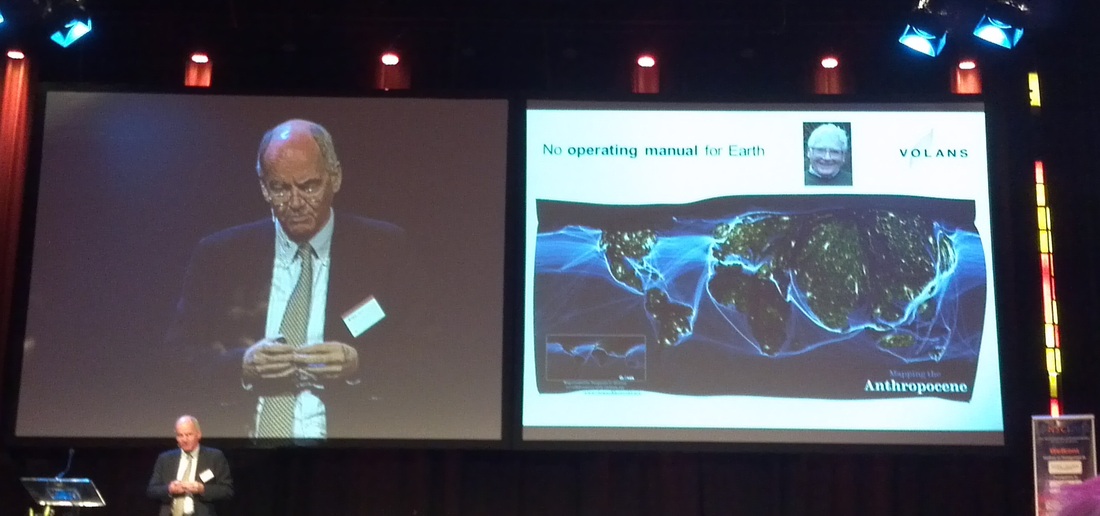
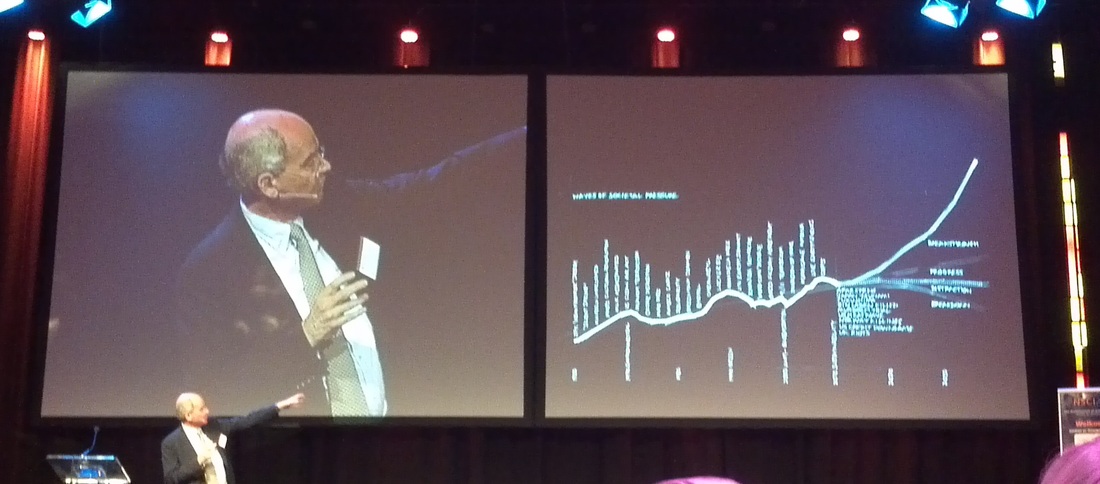
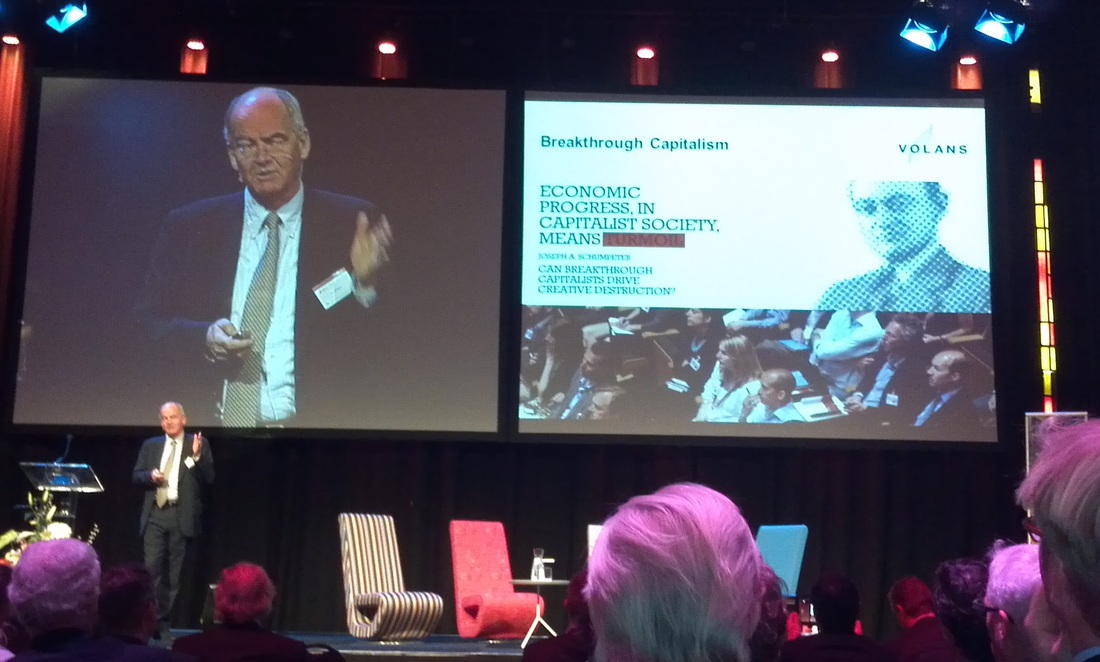
 RSS Feed
RSS Feed
















